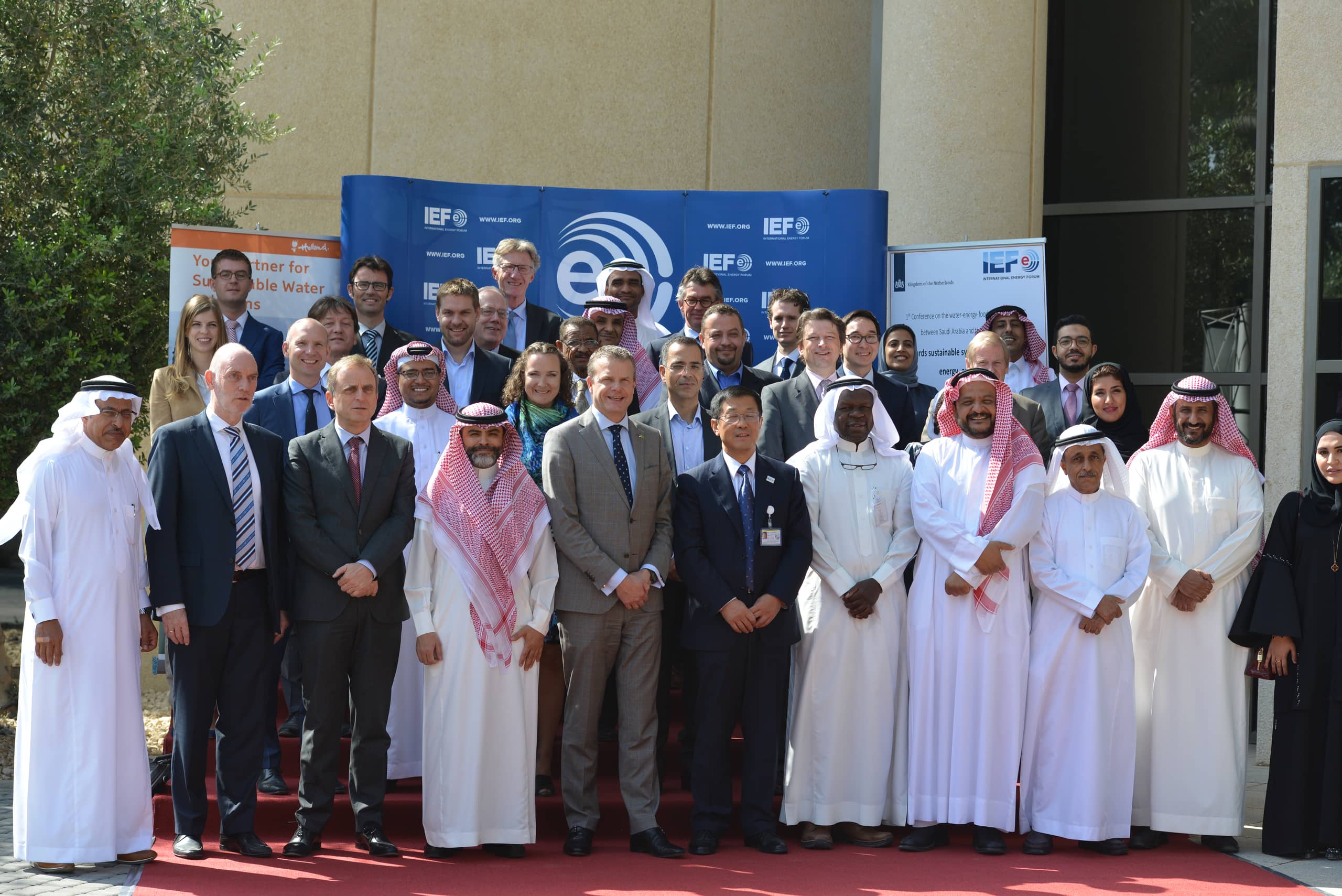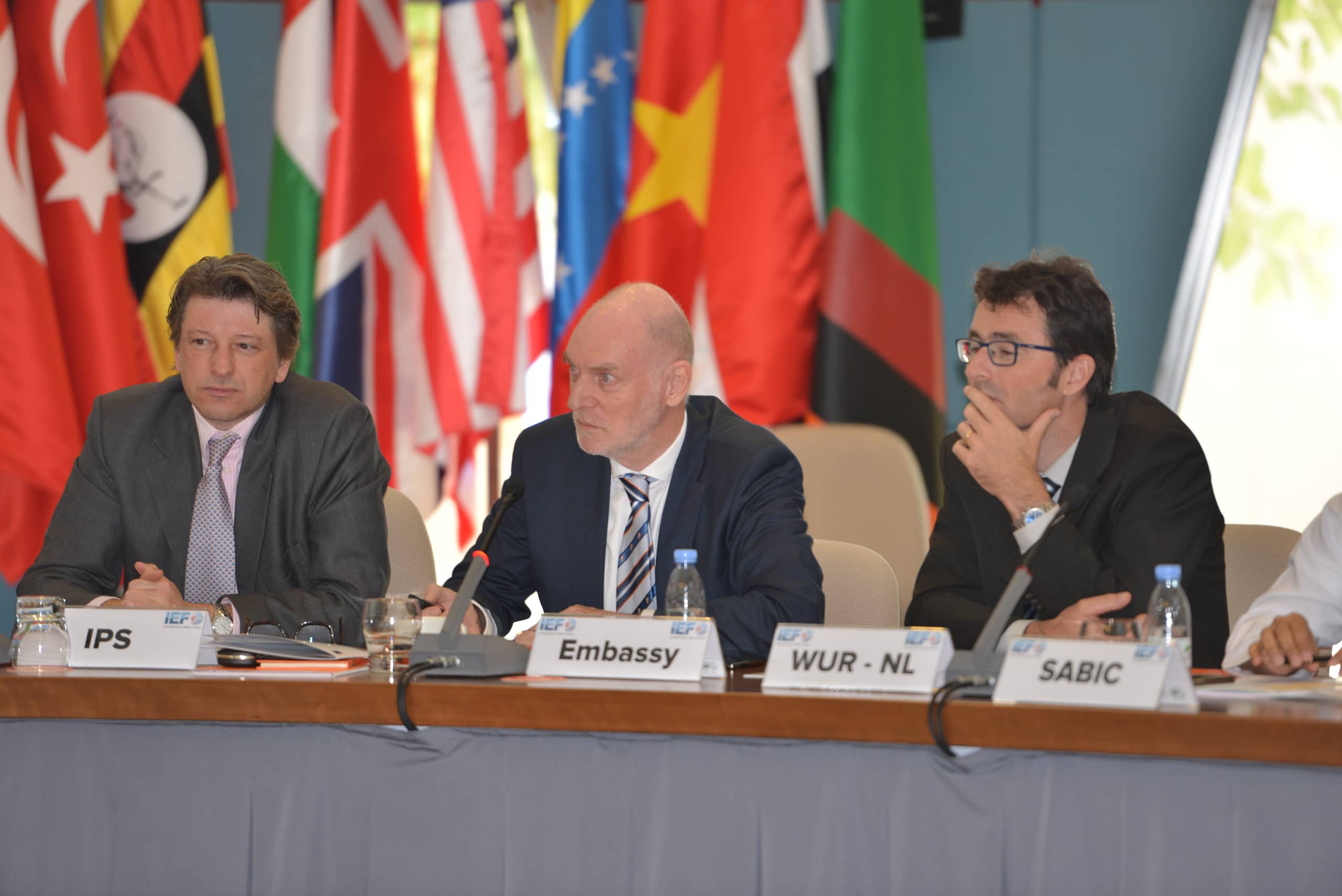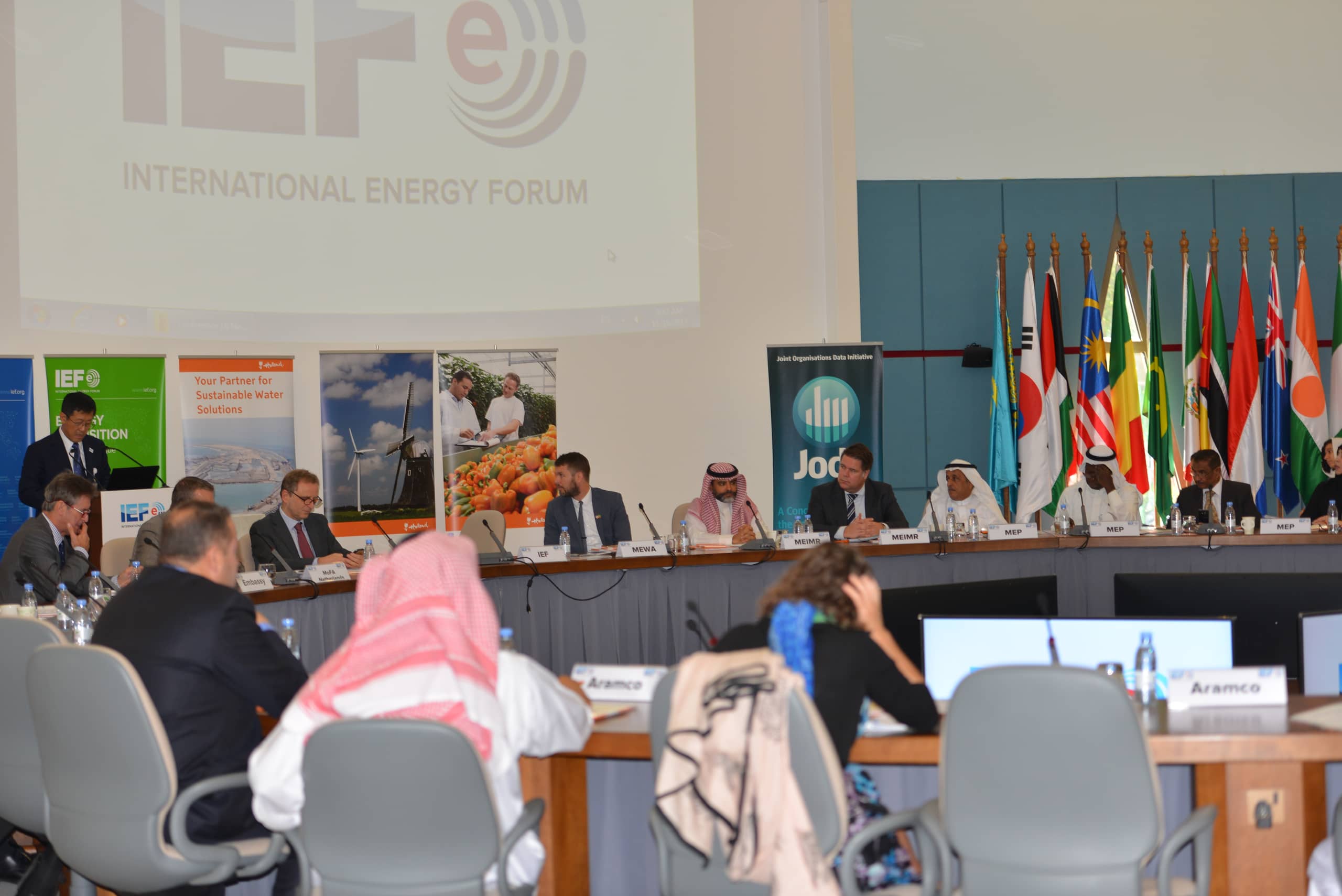The 1st conference between Saudi Arabia and the Netherlands on the water-energy-food nexus took place in Riyadh on the 16th of November 2017. The conference "Towards sustainable synergy between water, energy, and food" was organized by the agriculture team of the Embassy of the Kingdom of the Netherlands and was hosted by the International energy Forum.
The following report is prepared by the Dutch Embassy and reflects its vision on the outcome of the conference. The conference booklet including the program and speaker profiles can be viewed here.
The 1st conference on the water-energy-food nexus between the Kingdom of Saudi Arabia and the Netherlands brought together approximately 40 delegates from 25 entities, almost equally representing public, private and knowledge parties. The program included 1) opening statements with scene setters, followed by sessions on 2) Fostering sustainable synergies between water, energy and food, 3) Perspectives from government, industry and knowledge centers on fostering sustainable synergies between water, energy and food, and 4) conclusion. A list of speakers can be found on the conference program and the presentations are published on the websites of the IEF (www.ief.org) and the Embassy (www.agroberichtenbuitenland.nl/landeninformatie/golfstaten/). The active participation of all delegates from the various disciplines helped shape a positive outcome with clear follow-up actions.
Following the five objectives for the conference, subsequent observations were made:
- Presenting advantages of considering water, energy and food in a more holistic way:
All delegates agreed that an integrated water-energy-food nexus approach is the right way forward, though not in every case all aspects of the nexus are involved. It was also made clear that climate change and ecosystems are important elements in the nexus approach. There is not one uniform solution: the challenge is the same worldwide, yet solutions need to be location specific. At the knowledge level, Wageningen University and Research, Deltares and TNO demonstrated examples of a nexus approach in research, which are directly applicable. The Dutch waternexus (www.waternexus.nl) serves as an example of public, private and knowledge participation in such a complex subject. At company level, Aramco, Sabic, Almarai and Estidamah showed commitment for sustainable integrated solutions. - Exploring how policies in the Netherlands and Gulf Cooperation Council countries, and in particular Saudi Arabia, support nexus initiatives:
The Ministry of Energy, Industry and Mineral Resources presented that the GCC countries, including Saudi Arabia, are committed to maintain their level of fossil oil production. However, sustainable goals and taking care of the environment are being promoted more clearly; this is also in line with Vision2030, that envisions 3.5 and 8 GW by renewable energy by 2020 and 2030, respectively. Strengthening EU-GCC relations, especially on the topic of clean energy is needed. The Dutch Ministry of Economic Affairs and Climate elaborated on the energy system transformation taking place in the Netherlands; 6% of supply obtained in 2016 is from renewable sources (IEA average was 10%), and in electricity generation 15% is renewable (IEA average 24%). The main renewable energy target for 2020 is 14%, and 15% by 2023. The energy agreement between government and companies is focused on offshore wind energy that is planned to grow from 1 GW (2006) to 4.5 GW (2023). Recently, the Paris Agreement is added to the energy agenda aiming at 80-95% CO2-reduction by 2050.
- Seeking collaboration between the Netherlands and Gulf Cooperation Council countries, and in particular Saudi Arabia, in applied research:
The presence of several institutes and universities from Saudi Arabia and the Netherlands gave a unique opportunity to interact. KAPSARC shared simulation models in crop patterns taking into account water, energy and production and the policy options for reducing water consumption while maintaining food security and farmer welfare. TNO focused on the chances for applying renewable energy in water desalination, demonstrating successful applications of their technique. Deltares focused on water management using a minimum of input for industry and agriculture, to reduce pressure on non-renewable water sources (now 20% worldwide). WUR showed examples in the Netherlands in deploying salt / brackish water for industrial use and agriculture. Estidamah demonstrated that in high-tech greenhouse production a minimum of fresh water use can be achieved (5% of traditional use), while tripling production. A productive discussion followed the presentation, with Aramco, Prince Mohammad Bin Fahd University (PMU) and King Saud University (KSU) a.o., leading to the conclusion that government transparency is crucial to mobilize action in society, in particular by putting a value on money. The question was raised which sector holds priority: water security or food security. In the case of KSA water security seems more likely to be prioritized since agriculture can more easily be reduced by importing food. On top of that KSA is not an agriculture country.
- Presenting successful examples of synergies between water, energy and food sectors:
In light of worldwide challenges in the depletion of natural resources (examples from the Colorado River in the U.S. and mining in India were presented), several new initiatives were shared by various participants from the private sector like the Netherlands Water Partnership, Sabic, Aramco, Almarai, in addition to the before mentioned examples by research institutes. A wide range of examples, covering often parts of the water-energy-food nexus, either initiated from a company philosophy, or directed by government intervention were considered. Some of the presented examples entail an integrated role of public, private and knowledge partners. Nationwide support on different levels and scales is needed to implement policies regarding the water-energy-food nexus. - Collecting new ideas for public private partnerships, business-to-business opportunities, and collaboration among centers:
The conference gave ample opportunity to Saudi and Dutch partners to discuss follow-up activities amongst themselves. Fruitful contacts were established. A second conference will be held in January 2018 in the UAE.
Non-binding concluding statement, summarising conference discussions and next steps
“Turning challenges into opportunities”
This first conference on the water-energy-food nexus between the Kingdom of Saudi Arabia and the Kingdom of the Netherlands underlines the importance of looking at the challenges related to stress on natural resources: water, energy and food, from an integrated perspective, also taking into account climate change and ecological considerations.
We consider sustainable solutions in the use of natural resources crucial and timely, given the increase in world population, the increase in middle and higher income, and the effects of climate change.
Collaboration by all stakeholders and technical development is indispensable to meet future challenges. It was recognized that water, energy and food are increasingly interdependent, especially in countries in the Arab peninsula, where water scarcity is among the highest in the world. An integrated approach by the water, energy, and food nexus will also enable achieving the Sustainable Developments Goals, of which many are intertwined and premised on a rational and efficient use of water, energy, and agricultural resources.
The conference welcomed the engagement of stakeholders from public institutions, knowledge centres, and the private sector. The successful implementation of nexus projects depends on the integration of efforts across all sectors and stakeholder levels, and the sharing of research findings, practical experiences, and data on an inclusive platform such as the International Energy Forum provides.
We recognize that enhanced cooperation among public partners, at the policy level, and deeper contacts with the private sector is desired to make water, energy, and food supply chains more efficient, and facilitate the achievement of Sustainable Developments Goals. We acknowledge that business cases that are economically and ecologically sound and connect as many aspects of the nexus approach as possible, should be encouraged. Also, we recognize that collaboration between knowledge institutes and universities in Saudi Arabia and the Netherlands in the area of the nexus is beneficial to both Kingdoms as this will assist in informing policy and investment decisions, and can support business opportunities and economic ties between both countries and the GCC region.
We intend to set up an annual program to realize such collaboration and will consider the establishment of a “Nexus-platform” between Saudi Arabia, the Netherlands and other GCC countries to help advance our cooperation as it evolves over time. This could include but is not limited to research programs, exchange of scientists / students, possible nexus assessments, workshops, and matchmaking events with companies ranging from Small and Medium Sized Enterprises SMEs to large enterprises that may leverage and scale SME efforts.



